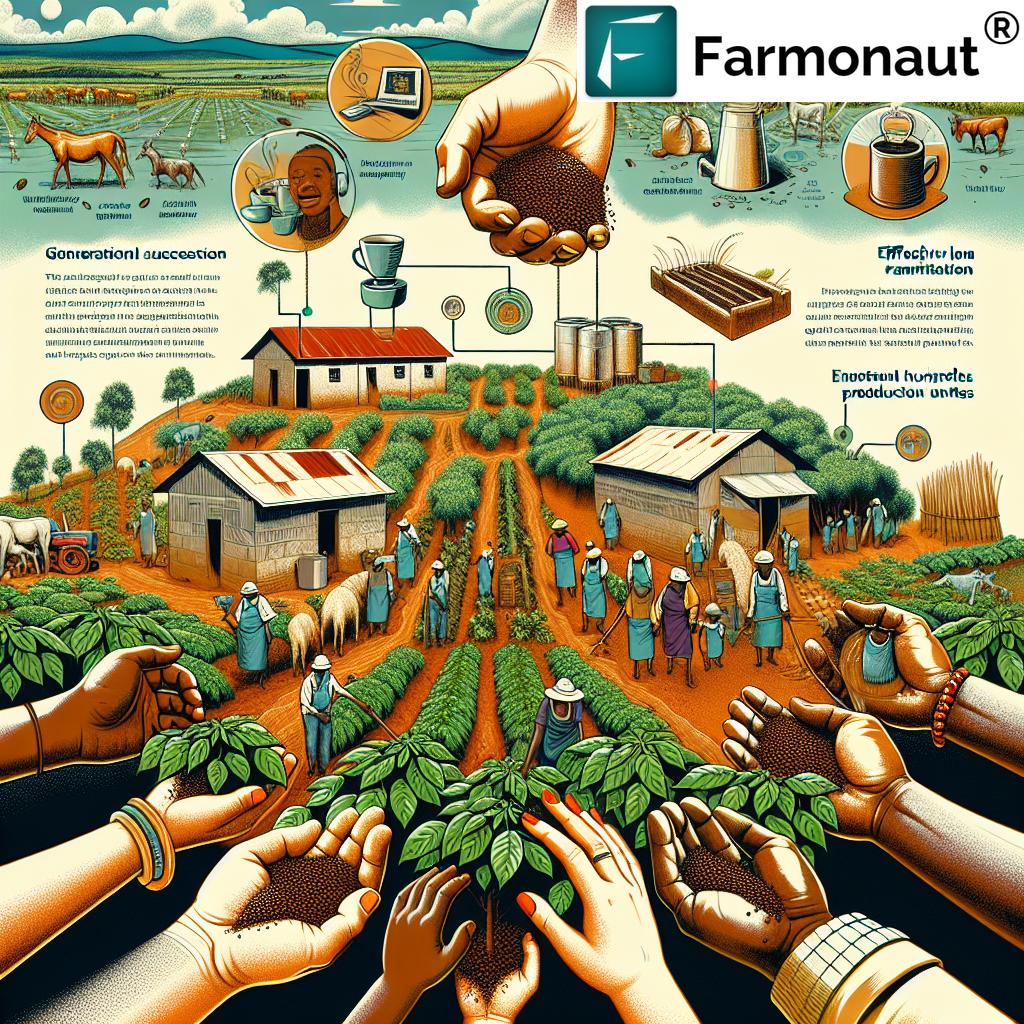Table of Contents
- Introduction: Coffee Farming in Othaya
- Trivia: Othaya’s Coffee Sector at a Glance
- The Current State of Coffee Farming in Kenya’s Othaya
- Succession Planning for Farmers: Maximizing Family Returns
- Strategy 1: Keep Plantations as a Single Entity
- Strategy 2: Implement Modern Coffee Plantation Management Practices
- Strategy 3: Engaging Youth in Agriculture
- Strategy 4: Transparency in Cooperative Societies
- Strategy 5: Leveraging Technology to Increase Coffee Yields
- Strategy vs. Impact Comparison Table
- Farmonaut: Empowering Sustainable Coffee Plantation Management in Othaya
- Farmonaut Subscription Plans
- Frequently Asked Questions (FAQ)
- Conclusion: The Future of Coffee Farming in Othaya
Coffee Farming in Othaya: 5 Proven Ways to Boost Family Returns
“Kenya’s Othaya region produces over 20,000 metric tons of coffee annually, supporting more than 15,000 farming families.”
In the picturesque landscapes of Othaya, Nyeri County, coffee farming defines the economic and cultural heartbeat of thousands of families. The sector’s unique blend of tradition, innovation, and resilience gives rise to some of the world’s most sought-after coffees. As we assess opportunities for increasing family returns, it is crucial to delve into the importance of succession planning for farmers, engaging youth in agriculture, up-to-date plantation management techniques, and embracing transparency in cooperative societies.
Drawing on current news—including recent statements by Agriculture and Livestock Development Cabinet Secretary Mutahi Kagwe—we examine challenges facing Kenyan coffee farmers and highlight five actionable strategies to maximize both yields and economic prospects for Othaya’s farming families.
The Current State of Coffee Farming in Kenya’s Othaya
Othaya occupies a unique place in Kenya’s coffee industry, contributing significantly to the country’s annual output. However, recent years have seen the sector grapple with challenges such as fragmenting plantations during succession, lower yields, reduced economic returns, and generational shifts away from farming.
According to the Kenya News Agency, Kagwe—the Cabinet Secretary for Agriculture and Livestock Development—has stressed that sub-dividing expansive coffee farms into smaller, less viable units is causing an adverse impact on yields and profitability. Instead, the CS advocates handing down coffee plantations as single family entities, bolstering their ability to function as thriving businesses and maximize economic returns for all family members.
- Kenyan coffee farmers in Othaya rely on both the coffee and livestock sectors for sustainable household income.
- Only about 10 percent of Kenyan youth are engaged in agriculture—posing long-term risks for the sector’s sustainability.
- Factors such as lack of mentorship, unattractiveness of farming, and barriers to land/capital make coffee farming less appealing to younger generations.
- Transparency and unity within cooperative societies significantly impact how profits are shared and invested back into production.
Succession Planning for Farmers: Maximizing Family Returns
The tradition of transferring land and agricultural assets from one generation to the next is well established in Othaya. However, the tendency to fragment coffee plantations during succession has proven detrimental to long-term profitability and productivity. By splitting farms into smaller units, farmers often face:
- Reduced economies of scale: Smaller farms struggle to optimize inputs and mechanization.
- Lower yields per unit area: Fragmented land is often less efficiently managed.
- Reduced ability to invest in technology or infrastructure: Margins are thinner and risks are higher on small units.
- Challenges in accessing markets and negotiating better prices.
Kagwe’s recent directive, encouraging coffee farmers in Othaya to treat their plantations as single family entities and avoid subdividing, aims to maximize long-term family returns, stabilize production levels, and foster an entrepreneurial mindset.
“Implementing modern management practices can increase coffee yields in Othaya by up to 30% within three years.”
5 Proven Ways to Boost Family Returns on Othaya Coffee Farms
After detailed analysis of industry news, sector trends, and expert opinions, we present these five proven strategies for maximizing coffee plantation yields, economic returns, and embracing a sustainable future in Othaya:
- Keep Plantations as Single Family Entities
- Implement Modern Coffee Plantation Management Practices
- Engage Youth in Agriculture
- Foster Transparency and Unity in Cooperative Societies
- Leverage Technology for Greater Yields and Traceability
Strategy 1: Keep Plantations as Single Family Entities (Succession Planning for Farmers)
Why It Matters: Succession is a pivotal event for every farming family. Research and government advisories highlight that subdividing established coffee farms often leads to smaller, less viable units incapable of maximizing production or leveraging industry trends.
- Higher Potential Returns: A single, intact coffee plantation allows for better utilization of resources and higher cherries produced per hectare.
- Streamlined Management: Centralized decision-making facilitates more efficient allocation of family labor, purchase of inputs, and joint investments.
- Attractive to Youth: Larger, more profitable businesses are naturally more appealing to young family members, mitigating the 10 percent engagement challenge facing Kenyan agriculture today.
This approach echoes Kagwe’s call for Othaya’s farmers to pass down their coffee plantations as whole entities, allowing returns from the sale of cherry to be shared fairly among family members—without compromising production scale or market competitiveness.
Strategy 2: Implement Modern Coffee Plantation Management Practices
Why It Matters: Transparent, science-driven management of coffee plantations directly enhances yields, especially when integrating sustainable agriculture practices.
-
Pruning and Canopy Management:
Effective annual pruning improves cherry yields and controls pests without resorting to excessive chemical application. -
Soil Health and Fertility:
Regular soil testing, organic matter management, and precise fertilizer use can increase productivity per acre and maintain long-term soil health. -
Pest and Disease Management:
Integrated management practices, informed by tools such as Farmonaut’s satellite-based crop health monitoring, allow for early detection and targeted intervention—optimizing costs and preventing yield loss. -
Water Management:
Using new techniques (rainwater harvesting, soil moisture monitoring) increases resilience to erratic rainfall patterns and reduces resource wastage.
Example: Farmonaut’s satellite-driven solutions empower farmers in Othaya with crop health monitoring and advisory, supporting
sustainable agriculture practices Kenya
. Precise input usage leads to healthier plants and reduces unnecessary expenditure—an essential for increasing coffee yields and family returns.
Strategy 3: Engaging Youth in Agriculture & Coffee Farming in Kenya
Why It Matters: For coffee farming in Othaya and Kenya at large to thrive, it is crucial to make agriculture attractive and accessible to the next generation.
- Mentorship and Inclusion: Families and cooperative societies should actively mentor youth—providing hands-on experience in plantation management, business processes, and leadership.
- Technology as a Draw: The adoption of AI, data-driven decision-making, and mobile/web-based farm management platforms appeals to younger, tech-savvy family members.
- Access to Capital and Land: Cooperative-backed microloans and government-supported programs can help break the traditional barriers cited by Kagwe.
Fact: Only about 10 percent of Kenyan youth are currently engaged in the coffee sector. By promoting mentorship, digitization, and practical support, families can empower their offspring to continue, innovate, and lead coffee businesses well into the future.
Strategy 4: Transparency in Cooperative Societies & Management
Why It Matters: Transparent, inclusive leadership directly increases trust, reduces losses from infighting or corruption, and allows farmers to fully benefit from the cooperative model.
- Open Financial Planning and Communication: Involve every member in financial decisions, including the sale of cherry, profit distribution, and reinvestment plans.
- Blockchain-Based Traceability: Implement traceability solutions for the coffee supply chain, ensuring every cherry delivered is accounted for, and proceeds are fairly shared.
- Performance Monitoring and Reporting: Use digital platforms for real-time reporting on production, bonuses, and member participation.
Case in Point: The Gachatha Coffee Factory in Othaya, highlighted by Kagwe, showcases best practices—with over 1,500 farmers receiving bonuses at a competitive rate of Sh150 per kilo of cherry delivered. Transparent societies return more to members and attract younger generations who seek integrity and openness in business.
To further secure trust throughout the value chain, tools such as Farmonaut’s blockchain-based coffee traceability provide verifiable data from farm to factory to consumer.
Strategy 5: Leveraging Technology to Increase Coffee Yields & Family Returns
Why It Matters: Modern farming increasingly depends on precision, data-driven decision-making, and scalable management tools. By leveraging agricultural technology, Othaya’s coffee farmers can:
- Monitor Crops with Satellite Imaging: Platforms like Farmonaut use multispectral analysis to alert farmers on vegetation health, soil moisture, and early stress indicators.
- Use AI-Based Advisories for Timely Interventions: Farmonaut’s Jeevn AI system delivers location-specific recommendations on nutrition, irrigation, and pest control.
- Optimize Operations via Fleet and Resource Management: Tools for monitoring machinery and logistics cut costs and increase operational efficiency. See Farmonaut’s fleet management solutions.
-
Reduce Carbon Footprint:
Real-time carbon footprint tracking tools such as those offered by Farmonaut help ensure compliance with global standards and attract premium buyers. Discover more at carbon footprinting. - Secure Financing with Data-Driven Assurance: Satellite-based farm verification streamlines crop loan and insurance access—a vital support for individual and family-owned coffee farms. Get insights on crop loan and insurance verification.
-
Integrate with Local and International Markets:
Technology strengthens the ability to track, prove, and market the quality of Othaya-grown coffee, enhancing returns per kilo delivered to factories and beyond.
By embracing these five strategies, Othaya’s coffee sector can not only boost family returns but also safeguard its global standing and legacy for future generations.
Strategy vs. Impact Comparison Table
| Strategy Name | Estimated Yield Increase (%) | Est. Increase in Family Returns (%) | Youth Engagement Level | Management Transparency Score (1–5) | Cost to Implement |
|---|---|---|---|---|---|
| Single Family Entity Succession | 18% | 22% | Medium | 3 | Low |
| Modern Management Practices | 30% | 28% | Medium | 3 | Medium |
| Youth Engagement | 25% | 19% | High | 3 | Low |
| Transparency in Cooperatives | 21% | 23% | Medium | 5 | Low |
| Leveraging Technology | 34% | 28% | High | 4 | Medium |
Farmonaut: Empowering Sustainable Coffee Plantation Management in Othaya
At the intersection of modern technology and traditional insight, Farmonaut enables coffee farmers in Othaya to transform their approach to succession planning, field management, transparency, and yield optimization.
- Satellite-Based Crop Health Monitoring: Receive regular, high-resolution insights on your plantation’s health, soil moisture, and potential yield challenges. Make informed choices on irrigation, fertilizer use, and pest management.
- AI-Powered Farm Advisory (Jeevn): Get actionable, personalized recommendations on farm practices, weather forecasts, and crop management—direct to your phone, web dashboard, or via API. Explore Farmonaut’s satellite and weather API or check its developer docs.
- Product Traceability with Blockchain: Prove the journey of your cherries from farm to factory through Farmonaut’s traceability platform, unlocking premium pricing, trust, and compliance for your family business.
- Fleet and Resource Management Tools: For larger farms and cooperatives, Farmonaut’s fleet management optimizes vehicle/equipment usage, reduces overheads, and ensures timely delivery of cherry to local factories or international buyers.
- Environmental Compliance and Carbon Footprint Tracking: Meet today’s sustainability standards, reduce emissions, and win contracts with eco-minded buyers through Farmonaut’s carbon footprinting tools.
- Scalability for Cooperatives, Individual Farms, and Agribusinesses: Whether you manage a smallholder plot or oversee a cooperative, Farmonaut’s large scale farm management solution is modular and customizable to diverse Kenyan coffee farming realities.
- Easy-to-Use, Multi-Platform Access: Access farm insights on Android, iOS, and web—and empower every member of your family to take part in decision-making.
These advanced, cost-effective solutions are designed for Kenya’s coffee sector, supporting Othaya’s farmers in their journey to maximize yields, engage youth, secure generational continuity, and foster industry transparency.
Farmonaut Subscription Plans
To ensure that all Othaya coffee farming families can harness the power of precision agriculture, Farmonaut offers accessible subscription plans—scaling from individual farms to large cooperatives. Choose the right plan for your needs, budget, and future ambitions. See the pricing table below:
Tip: For more tools and tailored solutions, visit the advisory overview page.
Frequently Asked Questions (FAQ)
What is the main challenge with subdividing coffee plantations during succession?
Subdividing coffee farms creates small units that are less productive, harder to manage, and less profitable. Family businesses operate best when plantations remain intact, supporting economies of scale, efficient input use, and shared returns.
How can families ensure smooth succession without subdividing?
Develop clear, legally recognized agreements that designate the farm as a business entity owned by all family members. Returns are then shared based on each member’s contribution or agreed terms, preventing fragmentation.
Why is youth engagement critical for the future of coffee farming in Othaya?
Without active youth involvement, the sector risks declining productivity and eventual abandonment. Youth bring fresh perspectives, technology adoption, and long-term continuity to family-owned coffee farms.
How does Farmonaut improve transparency and production in coffee cooperative societies?
Farmonaut’s blockchain-based traceability and satellite monitoring provide real-time, shared data on field health, harvests, and supply chain movement. This boosts member trust, reduces losses, and enhances transparency in financial processes.
What technology does Farmonaut offer for increasing coffee yields?
Farmonaut provides satellite-driven health maps, real-time AI advisories, environmental monitoring, and easy-to-use web and mobile tools for managing plantations—empowering farmers to maximize productivity and returns.
How can farmers get started with Farmonaut?
Farmers can sign up for Farmonaut’s services and access their platforms via web app, Android app, or iOS app.
Conclusion: The Future of Coffee Farming in Othaya
Othaya stands at an inflection point in its history as a global coffee exporter. By keeping coffee plantations as single family entities, investing in modern management and technology, empowering younger generations, and embracing transparent cooperative societies, farming families can boost their returns, preserve their heritage, and secure a thriving future.
With advanced yet affordable tools like Farmonaut—dedicated to providing actionable data, AI support, blockchain traceability, and scalable management platforms— every coffee farming family in Othaya, and by extension Kenya, can participate in the agricultural revolution.

Learn how Farmonaut supports precision coffee farming in Othaya & Kenya
Let us embrace industry best practices, robust family business models, and innovative technology for an even brighter, more prosperous generation of Kenyan coffee farmers.

















